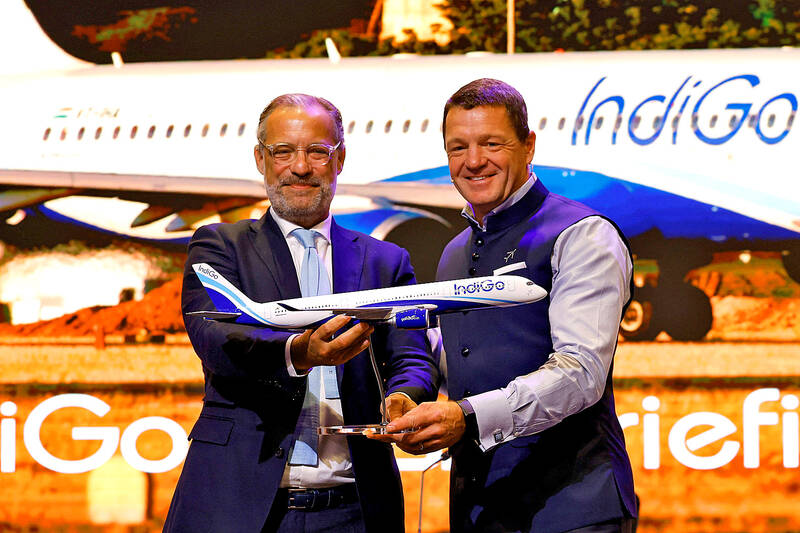The global aviation industry is benefiting from lower oil prices because they’re bringing down the cost of kerosene, International Air Transport Association (IATA) director-general Willie Walsh said yesterday.
The reduction in oil prices is in turn helping drive down ticket prices, Walsh said.
“It’s typically our single biggest cost, so it would help to offset any weakening demand if we were to witness a slowdown,” Walsh said in an interview with Bloomberg Television at IATA’s annual general meeting in New Delhi. “It also tends to have an impact on pricing. There’s almost a direct correlation between the price of oil and the price of airline tickets.”

Photo: Priyanshu Singh, Reuters
Airlines have become increasingly cautious about the demand outlook as global economic dislocations prompted by US President Donald Trump’s tariffs hurt demand. At the same time, a diminished economic outlook has also depressed oil prices, providing a cost advantage for carriers.
Walsh said that while lower ticket prices typically stimulate demand, it also “clearly drives down the overall revenue for the industry.”
Global aviation executives are meeting in New Delhi over the next few days to discuss the state of the industry. Walsh is set to unveil his formal outlook for profitability and revenue for the airline industry today.
Meanwhile, Indian airline IndiGo said yesterday it had signed an order for 30 more Airbus SE A350-900s, bringing its shopping list for the widebody aircraft from the European aircraft manufacturer to 60.
"We are placing a firm order for 30 Airbus A350-900s," said Pieter Elbers, CEO of IndiGo, a company founded in 2006 and already behind the largest contract by volume in the history of civil aviation — 500 Airbus single-aisle aircraft by 2023.
The Indian low-cost carrier, the country’s biggest by market share, is positioning itself as a significant player in the long-haul market.
"This strategic move will enable IndiGo to spread its wings further and expand its long-haul international network," the company said in a statement.
"This is yet another step in defining the airline’s long-term plans of international expansion."
The A350 planes, with ranges of up to 15,000 kilometers (9,300 miles), will allow it to further expand its network.
"The development of India’s air connectivity in recent years has been nothing short of phenomenal," Walsh said.
Indian domestic air growth is "running at over 10 percent" per year, he said.
The growth of its economy has made India and its 1.4 billion people the world’s fourth-largest air market — domestic and international — with IATA projecting it will become the third biggest within the decade.
Additional reporting by AFP

DIVIDED VIEWS: Although the Fed agreed on holding rates steady, some officials see no rate cuts for this year, while 10 policymakers foresee two or more cuts There are a lot of unknowns about the outlook for the economy and interest rates, but US Federal Reserve Chair Jerome Powell signaled at least one thing seems certain: Higher prices are coming. Fed policymakers voted unanimously to hold interest rates steady at a range of 4.25 percent to 4.50 percent for a fourth straight meeting on Wednesday, as they await clarity on whether tariffs would leave a one-time or more lasting mark on inflation. Powell said it is still unclear how much of the bill would fall on the shoulders of consumers, but he expects to learn more about tariffs

NOT JUSTIFIED: The bank’s governor said there would only be a rate cut if inflation falls below 1.5% and economic conditions deteriorate, which have not been detected The central bank yesterday kept its key interest rates unchanged for a fifth consecutive quarter, aligning with market expectations, while slightly lowering its inflation outlook amid signs of cooling price pressures. The move came after the US Federal Reserve held rates steady overnight, despite pressure from US President Donald Trump to cut borrowing costs. Central bank board members unanimously voted to maintain the discount rate at 2 percent, the secured loan rate at 2.375 percent and the overnight lending rate at 4.25 percent. “We consider the policy decision appropriate, although it suggests tightening leaning after factoring in slackening inflation and stable GDP growth,”

Greek tourism student Katerina quit within a month of starting work at a five-star hotel in Halkidiki, one of the country’s top destinations, because she said conditions were so dire. Beyond the bad pay, the 22-year-old said that her working and living conditions were “miserable and unacceptable.” Millions holiday in Greece every year, but its vital tourism industry is finding it harder and harder to recruit Greeks to look after them. “I was asked to work in any department of the hotel where there was a need, from service to cleaning,” said Katerina, a tourism and marketing student, who would

i Gasoline and diesel prices at fuel stations are this week to rise NT$0.1 per liter, as tensions in the Middle East pushed crude oil prices higher last week, CPC Corp, Taiwan (台灣中油) and Formosa Petrochemical Corp (台塑石化) said yesterday. International crude oil prices last week rose for the third consecutive week due to an escalating conflict between Israel and Iran, as the market is concerned that the situation in the Middle East might affect crude oil supply, CPC and Formosa said in separate statements. Front-month Brent crude oil futures — the international oil benchmark — rose 3.75 percent to settle at US$77.01